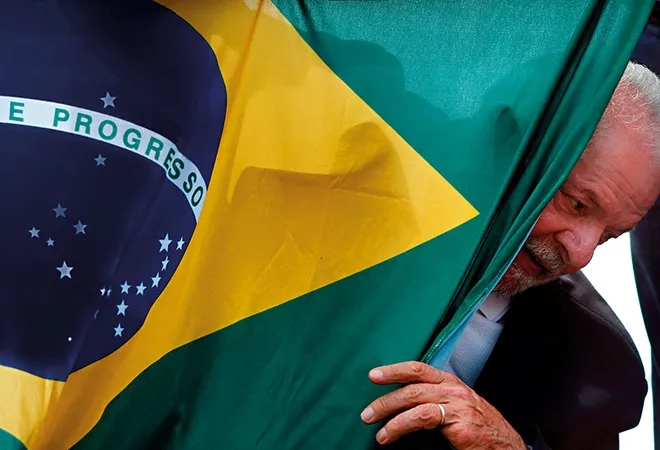
Shortly after being elected as president of Brazil for the third time, Luiz Inácio ‘Lula’ da Silva exclaimed at the November 2022 COP27 United Nations Climate Change Conference, “Brazil is back.” He emphasised that “Brazil is emerging from the cocoon to which it has been subjected for the last four years,” to cooperate on issues as diverse as deforestation and climate change, poverty, technology transfers, peace, and multilateralism.
Such slogans are commonplace in the world of politics, and even more so in geopolitics. So, is Brazil really back, and if so, how will this manifest?
The most telltale sign that Brazil is back is Lula’s rather regular international visits since assuming office in January 2023 to diverse geographies. In a short of just seven months, Lula visited 15 countries. He has covered all the major continents—Argentina, Colombia and Uruguay in South America; the United States (US) in North America; Belgium, France, Italy, Japan, Portugal, Spain, United Kingdom and the Vatican in Europe; China and the United Arab Emirates in Asia; and most recently, Cape Verde in Africa.
The most telltale sign that Brazil is back is Lula’s rather regular international visits since assuming office in January 2023 to diverse geographies.
This is a break from former president Jair Bolsonaro’s term in multiple ways. Notably, Bolsonaro never visited Africa throughout his four-year term; Lula has already visited more European nations than Bolsonaro, at an arguably more important time for Europe due to the Ukraine crisis. Bolsonaro also made a record eight visits to the US, and Washington DC (and moreover, former president Donald Trump) was central to Bolsonaro’s foreign policy calculations. On the other hand, while the Lula government does prioritise its relationship with the US, it is by no measure its most important bilateral partner.
Another major departure from the previous term is Lula’s attendance at global and multilateral summits, in an effort to include Brazil’s voice on global and regional dialogues that align with Brasília’s priorities. Over the past seven months, Lula has attended the Community of Latin American and Caribbean States Summit (CELAC)—a 33-country grouping, the Mercosur Summit—a regional bloc consisting of Brazil, Argentina, Paraguay and Uruguay, the G7 Summit—a grouping of seven advanced economies), the Power Our Planet festival and New Global Financing Pact summit in France, the Amazon Technical-Scientific summit in Colombia, and the CELAC–European Union in Brussels; he will also visit South Africa for the 15th BRICS Summit on 22–24 August 2023.
This rather proactive foreign policy by Lula has been termed by policymakers and observers as ativa e altiva (active and assertive, translated from Portuguese) and also by some as the Lula doctrine. Mauro Vieira, Brazil’s foreign minister, elaborated in a recent interview that “the Lula doctrine is one of restoring Brazil’s image and its relationships—not just with our Latin American neighbours, but also restoring Brazil’s presence in the world, on all the different kinds of world stages, be they bilateral or multilateral.”
For the remainder of his term, we should expect Lula to expand his global outreach to more countries in Africa, Asia and Europe. Brazil will also lend its voice more often to dialogues of global import, be it the war in Ukraine, poverty and hunger, climate change, currency controls, multilateral groupings and the reform of major international institutions.
For the remainder of his term, we should expect Lula to expand his global outreach to more countries in Africa, Asia and Europe.
Although Lula’s effort to raise Brazil’s global profile is genuine, it has so far been met with mixed success. Lula’s failed attempt at being an interlocutor between Ukraine and Russia, and his comments defending Venezuela’s authoritarian leader Nicolas Maduro are both examples that Brazil could perhaps be less hasty and recalibrate its responses on certain issues. Already, Lula has learnt from his mistakes to attempt to mediate between Russia and Ukraine and noted more recently that he doesn’t want to get involved in their war, instead choosing to fight his own war at home against hunger, poverty and unemployment.
Brazil certainly has the ability and wherewithal to become a major global leader. In fact, Brazil’s biggest claim to fame is perhaps its enviable aura of peace—Brazil has not fought any major external wars for more than 150 years; it has peaceful relations and no major border disputes with its 10 neighbouring countries; Brazil is also free from terrorism and major domestic conflicts. Unlike countries in Asia, such as India and China, which constantly face security threats in the form of terrorism or territorial disputes and the occasional war, Brazil mostly has domestic issues to contend with.
As Brazilianist Brian Winter notes, Lula and his foreign policy team believe that the “world is headed toward a new, more equitable ‘multipolar’ era in which, instead of one country at the head of the table, there will be, say, eight countries seated at a round table—and Brazil will be one of them, along with China, India and others from the ascendant Global South.”
Unlike countries in Asia, such as India and China, which constantly face security threats in the form of terrorism or territorial disputes and the occasional war, Brazil mostly has domestic issues to contend with.
Still, despite this renewed motivation to insert Brazil in global affairs, it is still possible that Brazil reverts to its rather infamous moniker as the “country of the future.” Whether Lula’s intention to raise Brazil’s global profile comes to fruition is yet to be seen and it remains a difficult task to complete in a short of just four years.
Hari Seshasayee is a Visiting Fellow at ORF and is an advisor to the Foreign Ministry of Panama, and an Asia-Latin America Expert at the United Nations Development Programme.
The views expressed above belong to the author(s). ORF research and analyses now available on Telegram! Click here to access our curated content — blogs, longforms and interviews.




 PREV
PREV


